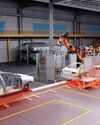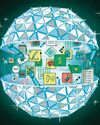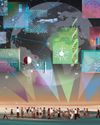
WITHIN MINUTES OF THE OCT. 31 ISRAELI attack on the Jabalia refugee camp in Gaza, the victims began flooding the Indonesian Hospital a mile away. Dr. Marwan Sultan, the hospital's medical director, says that most of the injured and dead were women and children. Some had deep burns, serious head injuries, or missing limbs, Sultan told TIME four hours after the attack. There are only 16 intensive-care beds in the hospital, which was running dangerously low on fuel, threatening the lives of his patients. If the electricity goes, says Sultan, "they will die. They will die."
The conditions for medical care in Gaza are deteriorating across the besieged 140-sq.-mi. coastal strip. Surgeons are operating by flashlight and rationing water, anesthesia, and the generator fuel needed to perform surgeries, provide electricity for incubators, and care for kidney-dialysis patients, doctors and health organizations tell TIME. The roughly two dozen hospitals still operating in Gaza are absorbing the patients of the 12 that have closed because of a lack of supplies and the ongoing bombing, says the World Health Organization (WHO). "Medical teams are on their knees," says Hisham Mhanna, spokesperson for the International Committee of the Red Cross in Gaza.
All war zones are awful, but Gaza presents a unique hell. Much of the enclave of 2 million is now a battlefield, with civilians and combatants intermixed, and homes and businesses sitting side by side with military infrastructure. Nowhere is that reality felt more keenly than at the territory's hospitals, which have simultaneously become safe havens and potential targets, and where the impact of Israel's offensive is measured every day in lives-more than 9,000 killed as of Nov. 2, including 135 medical personnel, according to the Palestinian Ministry of Health.
Denne historien er fra November 20, 2023-utgaven av Time.
Start din 7-dagers gratis prøveperiode på Magzter GOLD for å få tilgang til tusenvis av utvalgte premiumhistorier og 9000+ magasiner og aviser.
Allerede abonnent ? Logg på
Denne historien er fra November 20, 2023-utgaven av Time.
Start din 7-dagers gratis prøveperiode på Magzter GOLD for å få tilgang til tusenvis av utvalgte premiumhistorier og 9000+ magasiner og aviser.
Allerede abonnent? Logg på

Q & A: Borge Brende
The World Economic Forum president talks with TIME editor Sam Jacobs

Q & A - Rene Haas
Arm's CEO on how his hardware is supporting the Fourth Industrial Revolution

The conflicts looming over 2025
WHEN DONALD TRUMP TOOK THE OATH OF OFFICE AS President in January 2017, his first foreign policy priority was to get tough on China. The Trump 2.0 Administration will continue that work. But when he strides back into the Oval Office in January 2025, Trump will also become responsible for U.S. management of two dangerous wars, the kinds of hot foreign policy crises he was fortunate to avoid during his first term.

Rev Lebaredian
Nvidia's vice president of Omniverse and simulation technology on training AI-powered robots

5 predictions for AI in 2025
New uses and policy questions come into focus

Roy Wood Jr. The comedian on his new stand-up special, the importance of working in food service, and learning from Keanu Reeves
8 QUESTIONS WITH Roy Wood Jr.

A call for global cooperation in the Intelligent Age
Cultivate wisdom along with innovation

The D.C. Brief
IN THE END, THE THREAT OF A FARright revolt proved more menacing than most imagined, as Republican Mike Johnson initially came up short on Jan. 3 during the first balloting to keep him as Speaker.

The digital labor revolution
OVER THE PAST TWO YEARS, WE'VE WITNESSED advances in AI that have captured our imaginations with unprecedented capabilities in language and ingenuity. And yet, as impressive as these developments have been, they're only the opening act. We are now entering a new era of autonomous AI agents that take action on their own and augment the work of humans. This isn't just an evolution of technology. It's a revolution that will fundamentally redefine how humans work, live, and connect with one another from this point forward.

Tech we can trust
Serving humanity's best interests must be at the center of progress